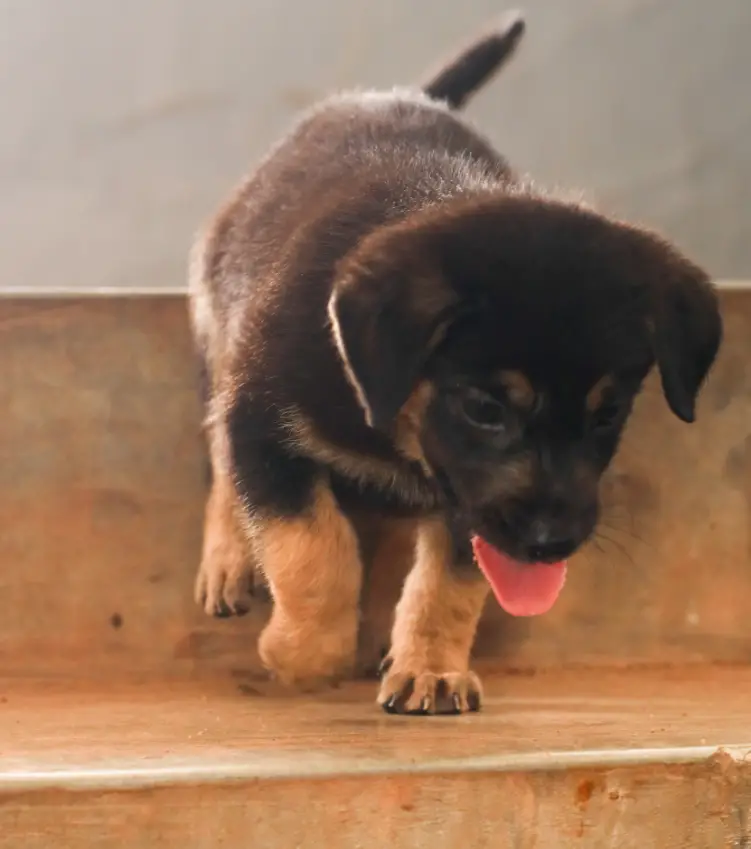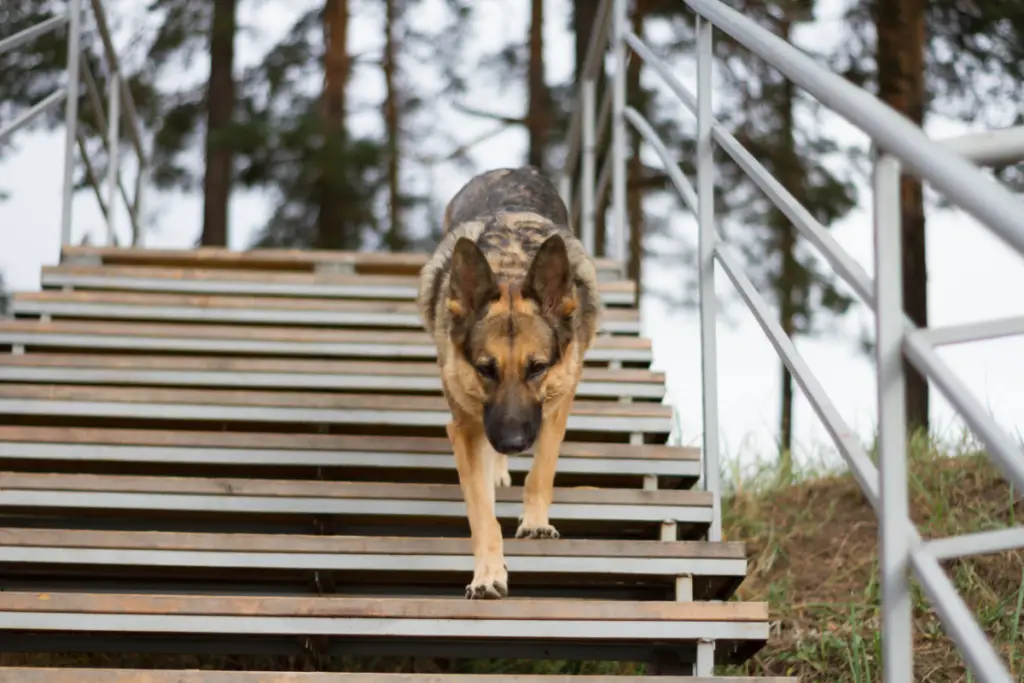Excessive stair climbing can potentially be hard on a German Shepherd puppy’s developing joints, including their hips. German Shepherds are known to be prone to hip and elbow dysplasia, so it is particularly important to be mindful of their physical activities while they are still growing.
For the German Shepherd puppy, stairs can cause issues that could be disabling later in life. Read on to discover why your Germans Shepherd puppy shouldn’t be allowed on the stairs.

Can Puppies Climb Stairs?
The short answer to this question is, “Yes, most puppies can climb stairs.” The question is not whether or not they can, but whether or not they should.
Since puppies do not yet have good coordination, there is a pretty big risk of them tumbling down the stairs. This can lead to serious injury, especially for very young dogs.
For larger breed dogs such as the German Shepherd, it is not recommended that puppies are allowed to climb up and down stairs. One solution is to build them a ramp so that they can safely travel up and down the stairwell without having to manage the stairs.
Will Stairs Hurt Your German Shepherd Puppy’s Hips?
According to a study from the Institute of Canine Biology, stairs could, indeed, hurt your German Shepherd puppy’s hips.
The studies mentioned above show that allowing young puppies to climb up and down stairs could lead to hip dysplasia, and it wasn’t just in pups.

The same is true for older dogs, according to this same research that is mentioned above. While most experts advise that it is okay for adult German Shepherds to use the stairs, this study suggested that hip dysplasia could be an issue later in life for both puppies and mature dogs who regularly did so.
Since German Shepherds have a tendency toward developing hip dysplasia, the risk could be even greater for them. Even if you choose to allow your dog on the stairs, it should never happen before they have passed 3 months of age.
What is Hip Dysplasia?
Hip dysplasia occurs when the tendon that holds the femur tightly in place at the pelvis stops holding. When this tendon is damaged in any way or severed, the joint will loosen up and cause further damage to the bone inside of the hip.
This, in turn, will cause issues with pain and mobility, making it harder for your dog to get around, play, jump, run, or even sit comfortably at times. Dogs are not born with hip dysplasia. It is something that happens over time.
A number of factors can cause hip dysplasia in dogs, including poor nutrition, lack of exercise, being overweight, factors in the dog’s environment, unstable joints, and genetics. German Shepherds are genetically predisposed to developing this issue.
Why is Your German Shepherd Scared of the Stairs?
In most cases, when a dog acts afraid to use the stairs, they are either too young to maneuver stairways or have never seen stairs before and don’t know what to do.
If your dog has always used the stairs but suddenly develops a new fear of them, it could be a sign of other issues.
For example, an adult dog who becomes scared of the stairway seemingly overnight might be developing hip and joint problems. Stiff and sore joints can make it hard for it to get up from a lying position, run, jump, or climb stairs.
It may also be that the dog had fallen down the stairs when you weren’t home or unaware. In such cases, it will likely tuck its tail between its back legs, pin its ears back, and refuse to go up or down.
Should You Carry Your German Shepherd on the Stairs?
Unless you are a bodybuilder, chances are you probably can’t carry an adult German Shepherd up and down a flight of stairs, but should you do so for a puppy? Is it really necessary to build a ramp just for a few months of use?
Since your puppy cannot climb the stairs or go down until it reaches the age of 3 months, you might choose to carry it. There is no reason that you cannot have the pup in your arms as you travel up and down the stairway unless you have balance issues or cannot carry even small loads.
Before deciding on carrying your puppy up and down stairs, however, you should keep in mind that while potty training, there will be mad rushes to the yard.
You might not want to have to run down the stairs holding a squirming puppy that has personal business to handle immediately.
What if Your German Shepherd Falls Down the Stairs?
Even if you don’t allow your German Shepherd puppy to use the stairs just yet, accidents can still happen. You can turn your head for just a second, and they can take a tumble down the stairs.
You can prevent this by installing some form of baby gate or pet gate at the top and bottom of the stairway. While this can be a bit aggravating when carrying things up and down, it is vital that everyone makes sure to close these gates behind them.
If an accident does happen and your puppy falls down the stairs, you should call your vet immediately – even if the pup seems fine. He could have internal injuries that you can’t see, and many puppies can sometimes act oblivious to pain.
If your puppy is having issues breathing, acting lethargic, or bleeding after falling down the stairs, you might need to administer first aid for dogs until you can get them to the vet.
Try to keep the pup from struggling or moving too much until X Rays can determine whether or not there are any broken bones, etc.
Conclusion
Since German Shepherds are predisposed to dysplasia, managing the stairs could be a risk even to an adult dog.
Puppies under the age of 3 months should never be allowed on the stairs. Please feel free to explore more of our articles on Germans Shepherds and ways to keep them healthy, happy, and safe.
